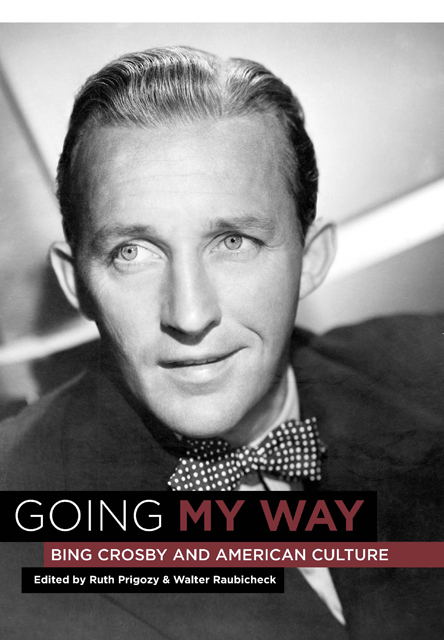Book contents
- Frontmatter
- Dedication
- Contents
- List of Illustrations
- Foreword
- Preface
- Acknowledgments
- Introduction Bing Crosby—Nothing Is What It Seems
- Part 1 Theoretical Perspectives on Crosby
- Part 2 Cultural Perspectives on Crosby
- Part 3 Historical Perspectives on Crosby
- Personal Comments
- Selected Bibliography
- List of Contributors
- Index
4 - Bing on a Binge: Casting-Against-Type in The Country Girl
Published online by Cambridge University Press: 11 March 2023
- Frontmatter
- Dedication
- Contents
- List of Illustrations
- Foreword
- Preface
- Acknowledgments
- Introduction Bing Crosby—Nothing Is What It Seems
- Part 1 Theoretical Perspectives on Crosby
- Part 2 Cultural Perspectives on Crosby
- Part 3 Historical Perspectives on Crosby
- Personal Comments
- Selected Bibliography
- List of Contributors
- Index
Summary
Premiering on December 21, 1954, The Country Girl (1954) enjoyed immediate critical success. It starred Bing Crosby as Frank Elgin, a former musical comedy star crippled by alcoholism and self-doubt, Grace Kelly as Georgie, Elgin's drab and weary wife, and William Holden as the Broadway producer who champions Elgin in a comeback role. The film was nominated for seven Academy Awards, including nominations for best picture, best director, best art direction (black and white), and best cinematography. Grace Kelly won the Oscar for best actress, and the film's writer-director, George Seaton, won for best screenplay. Crosby was nominated for best actor, and although he lost to Marlon Brando in On the Waterfront (1954), he did win the Look magazine award for best film performance of 1954. Indeed, Crosby's performance in The Country Girl was heralded as (and generally continues to be considered) one of the best of his career. In fact, the role of Frank Elgin was a quintessential example of casting-against-type, or “departure casting,” in that Elgin is unlike nearly every other character Crosby had portrayed on screen to that point in time. This case study of The Country Girl examines two factors that led to the favorable reception of Crosby's atypical casting: the manner in which Paramount used Crosby's established star persona to prepare audiences for—and sell audiences on—this casting-against-type, and the way in which the persona itself, both despite and because of its differences from the character Elgin, substantively contributed to the perceived quality of Crosby's performance.
As has long been recognized, the Hollywood star system—whereby studios used stars to differentiate, stratify, and market films—depends on a necessary stability in star personae as a sort of product quality control to ensure the value and effectiveness of any given star's “brand.” Thus, during the studio era, the systemgave rise to the preference for what Barry King calls personification (the creation and dissemination of a recognizable persona, usually based on physical type) over impersonation (naturalistic, “believable” performances of a wide variety of roles). In theory, given this foundational necessity for star persona consistency, it would seem that, almost by definition, casting-against-type should result in films that audiences will reject.
- Type
- Chapter
- Information
- Going My WayBing Crosby and American Culture, pp. 47 - 64Publisher: Boydell & BrewerPrint publication year: 2007

